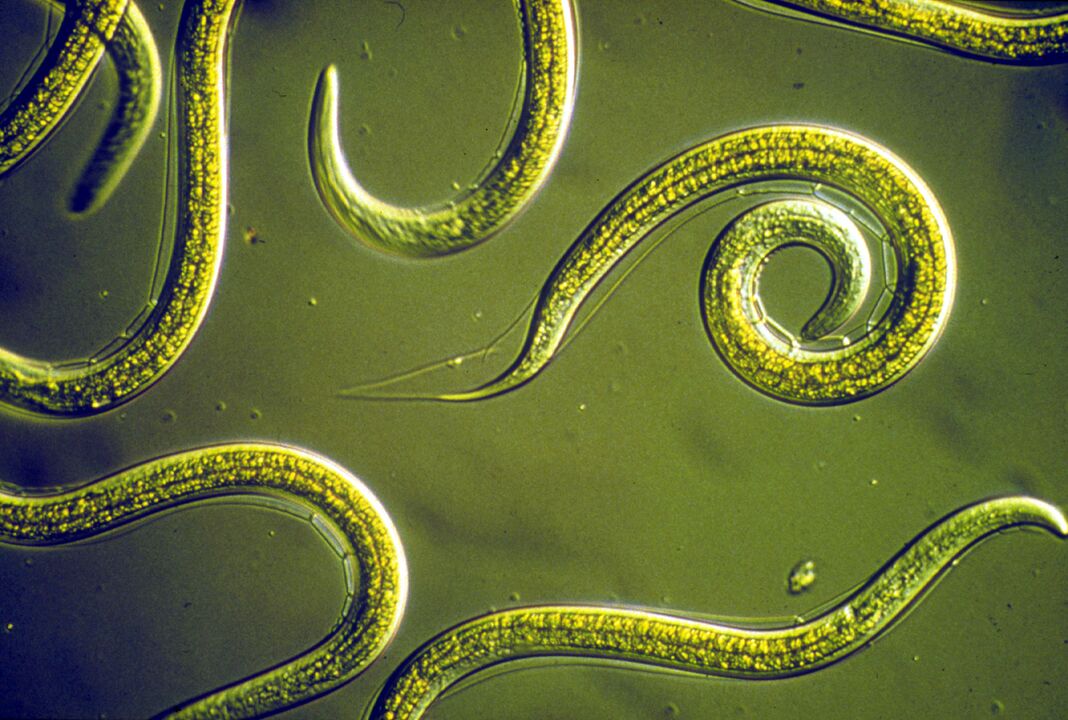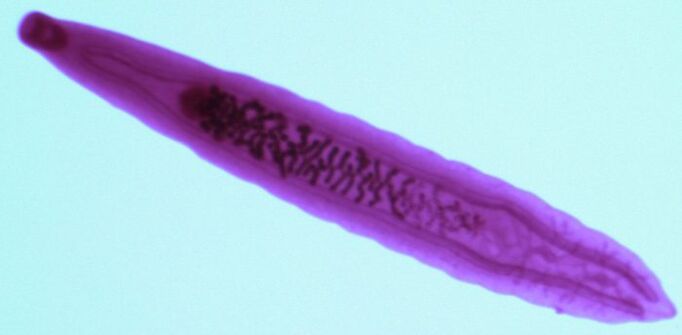Anyone can get a worm infection. Children go to kindergarten, adults - for other reasons. Despite all preventive measures, you need to know the symptoms of worms in humans in order to detect the disease in time and start treatment. We will take a closer look at what worms are, where they live and how they manifest themselves.
What organs can worms affect?

There are two types of invasion: abdominal and tissue. Depending on the species, the habitats are also divided into:
- Hollow worms are located in the small and large intestines. In particular, the first sections of the small intestine are affected by extensive tapeworm, ankylosing spondylitis, roundworm. The lower part of the small intestine is home to the dwarf tapeworm, the pinworm. The large intestine becomes the habitat of most whipworms.
- Tissue helminths affect any type of organ: liver, brain, lymph nodes, bile ducts.
It is important! At the initial stage of the development of an invasion, it is impossible to determine the signs of the presence of worms in a patient. Although the number of worms is small and the toxicity of waste products is normal, the body itself copes with the invasion. The appearance of characteristic or acute symptoms indicates a significant increase in the number of helminthic infestations: the maturation of individuals and their dynamic development.
Chain types

When determining the symptoms of worms in adults, you need to understand what invasion we are talking about:
- Vlasoglavy. The chains were named for a filamentous body with a thickening at the rear end. The life cycle of parasites is straightforward. Habitat - tropics, subtropics. The chains are localized in the appendix, so they are difficult to erode.
- Nematod. A subspecies of roundworms that live in nature and in the human body. The most popular representatives: roundworms, pinworms.
- Fluke. Flat type hairs. Because they can be located in any organ or system, they pose a great threat to the body of the carrier. Representatives: schistosomiasis, opistorchiasis worms.
- Pork worm (tapeworm). Tapeworms are hermaphrodites. Strong hooks on the head to attach to the walls can affect the brain, intestines, liver, eyes, muscles. Consequences of untreated: paralysis, death of the carrier.
All types of worms are found in the human body. After suffering from ascariasis, enterobiosis, diphyllobotriasis, the patient experiences malnutrition, the intestines stop receiving food residues normally. Outcomes of the invasion: metabolic disorders, neurohumoral reaction.
Here are some facts about the ways of infection:
- ascariasis - unwashed vegetables, fruits, hands;
- Raw or lightly salted fish, caviar - diphyllobotriasis;
- Pinworms - a method of contact-household. The development period is up to 60 days, after which there is a phase of chronic occupation, characterized by a decrease in immunity and a high frequency of infectious diseases, exacerbation of chronic processes.
Signs of worms in humans
The general symptoms of worms in adults depend on the location of the helminths. The main danger is parasites that live in vital organs. Worms appeared, symptoms are hidden: weakness, cough. Although an examination is needed for a complete diagnosis. However, there are a number of signs that you can determine: where the worms are and whether they are present at all.
Brain

Often there are no obvious symptoms, but if worms live in the human brain, the patient may be:
- persistent nausea attacks;
- frequent vomiting;
- severe weakness;
- lethargy of consciousness;
- decreased visual acuity, hearing;
- fluctuations in body temperature for no apparent reason;
- epilepsy.
Fact! Often, parasites are found in the brain only after autopsy.
In the body

Hundreds of known types of parasites can live in a patient's body. It is difficult to detect the presence of worms in the body of an adult. Symptoms vary depending on the area of localization: in the heart, liver, lungs, under the skin. Common symptoms of worms in adults:
- muscle, joint pain;
- skin deterioration;
- weight jumps: reduce or build;
- severe constant fatigue;
- immediate decrease in immunity.
Fact! Some worms have the ability to crawl from the anus to the perineum, penetrate blood flow to other organs, appear in the abdominal cavity, and affect the nose and ears.
In the intestines

The most common worms in humans, with more severe symptoms, can be found in the large and small intestines. Infection occurs through oral contact. Larvae from eggs and the developmental stage of an adult take place in the intestinal mucosa. The parasite takes in food for itself, preventing them from being absorbed by the intestines. For this reason, adults have intestinal problems that cause helminths. Symptoms:
- the stomach often swells;
- feces are broken;
- flatulence appears;
- changes in body weight;
- wants to eat constantly and strongly.
Of course, the symptoms of worms can be different, if the patient grows with the characteristic symptoms of gastric diseases. Therefore, proper diagnostic measures are very important. Only an expert will determine exactly: where the worm is located, the type of invasion and the dynamics of development.
Symptoms of helminthiasis, depending on the type of parasite
In adults, the symptoms of worms may differ from those in childhood. Strong immunity repels the invasion, but the child does not have such a feature. Knowing the signs of worms in a person makes it easier to understand the cause of the disease and consult a doctor at the first suspicion of infection. An infectious disease specialist, parasitologist, helminthologist - the required profile specialist will soon understand where worms live in the human body and how to get rid of them.
Each parasite provokes the appearance of its own symptoms:
- tapeworms have intestinal problems: anorexia, sleep disorders, flatulence;
- roundness - cough, bloating, flatulence, anorexia.
It is important! Roundworms or roundworms grow up to 40 cm in length and can easily move along the intestinal walls, living in the lungs and liver. This is a very dangerous occupation that must be destroyed.
Regardless of whether tapeworms or roundworms live in the human body, they need to be removed. Even in small amounts, the invasion can cause serious damage to the body, and a large number of parasites poison the host and often cause the death of the patient. Knowing where the worms live, do not rush to write about the frequent swelling for ordinary indigestion, perhaps it is a sign of helminthiasis, that is, it's time to see a doctor.






































